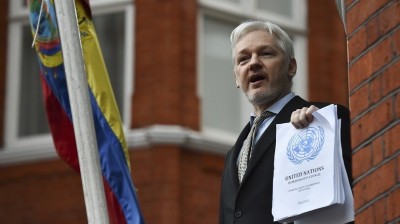Candidate Trump: ‘I Love Wikileaks.’ President Trump: ‘Arrest Assange!’

“I love Wikileaks,” candidate Donald Trump said on October 10th on the campaign trail. He praised the organization for reporting on the darker side of the Hillary Clinton campaign. It was information likely leaked by a whistleblower from within the Clinton campaign to Wikileaks.
Back then he praised Wikileaks for promoting transparency, but candidate Trump looks less like President Trump every day. The candidate praised whistleblowers and Wikileaks often on the campaign trail. In fact, candidate Trump loved Wikileaks so much he mentioned the organization more than 140 times in the final month of the campaign alone! Now, as President, it seems Trump wants Wikileaks founder Julian Assange sent to prison.
Last week CNN reported, citing anonymous “intelligence community” sources, that the Trump Administration’s Justice Department was seeking the arrest of Assange and had found a way to charge the Wikileaks founder for publishing classified information without charging other media outlets such as the New York Times and Washington Post for publishing the same information.
It might have been tempting to write off the CNN report as “fake news,” as is much of their reporting, but for the fact President Trump said in an interview on Friday that issuing an arrest warrant for Julian Assange would be, “OK with me.”
Trump’s condemnation of Wikileaks came just a day after his CIA Director, Michael Pompeo, attacked Wikileaks as a “hostile intelligence service.” Pompeo accused Assange of being “a fraud — a coward hiding behind a screen.”
Pompeo’s word choice was no accident. By accusing Wikileaks of being a “hostile intelligence service” rather than a publisher of information on illegal and abusive government practices leaked by whistleblowers, he signaled that the organization has no First Amendment rights. Like many in Washington, he does not understand that the First Amendment is a limitation on government rather than a granting of rights to citizens. Pompeo was declaring war on Wikileaks.
But not that long ago Pompeo also cited Wikileaks as an important source of information. In July he drew attention to the Wikileaks release of information damaging to the Clinton campaign, writing,
“Need further proof that the fix was in from President Obama on down?”
There is a word for this sudden about-face on Wikileaks and the transparency it provides us into the operations of the prominent and powerful: hypocrisy.
The Trump Administration’s declaration of war on whistleblowers and Wikileaks is one of the greatest disappointments in these first 100 days. Donald Trump rode into the White House with promises that he would “drain the swamp,” meaning that he would overturn the apple carts of Washington’s vested interests. By unleashing those same vested interests on those who hold them in check – the whistleblowers and those who publish their revelations – he has turned his back on those who elected him.
Julian Assange, along with the whistleblowers who reveal to us the evil that is being done in our name, are heroes. They deserve our respect and admiration, not a prison cell. If we allow this president to declare war on those who tell the truth, we have only ourselves to blame.

